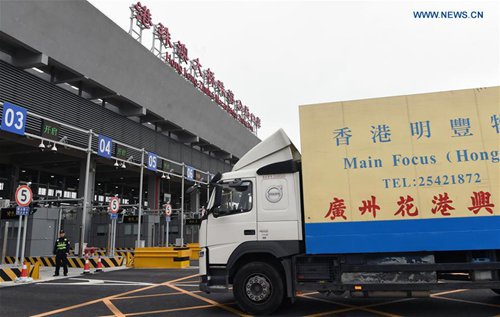HOME >> CHINA,SPECIAL-COVERAGE
HK life necessities depend on mainland resources
By Yang Sheng and Wang Cong Source:Global Times Published: 2019/8/21 0:03:39
Separatists must realize unbreakable connectivity of two regions: expert

A Hong Kong-registered truck goes through the Zhuhai Port of the Hong Kong-Zhuhai-Macao Bridge in Zhuhai, south China's Guangdong Province. Photo: Xinhua
Water, electricity, meat, vegetables and fruits: Hong Kong largely depends on the Chinese mainland for all these life necessities and countless other resources, Chinese experts said Tuesday as they stressed the unbreakable connection of the two regions.
In an interview with the People's Daily overseas edition's new media platform Xiakedao on Monday, a scholar joked about cutting off the water supply to Hong Kong.
Zheng Yongnian, director of the East Asian Institute at the National University of Singapore, told Xiakedao that in general, anti-mainland protesters and separatists won't make big trouble.
"A senior official in Singapore said that you [the Chinese mainland] just need to cut off water to Hong Kong and then everything would be settled, as Singaporeans are very sensitive about this… if Malaysia stopped the water supply it would become a big problem."
Zheng added, "Of course, this is just a joke. In fact… most Hong Kong people understand that they cannot separate themselves from the mainland."
Unfortunately a few media outlets took Zheng's quotes out of context, reporting "Zheng Yongnian said cutting off the water supply can resolve the Hong Kong problem."
Xiakedao and Zheng had to release statements Tuesday to condemn such distorted headlines which caused unnecessary misunderstanding.
"In fact, cutting off the water and electric power supply to Hong Kong is truly unnecessary for solving the current problem in Hong Kong as the central government has enough capability and strength to use other measures to deal with any kind of situation," said Tian Feilong, an associate professor at Beihang University in Beijing and a Hong Kong expert.
Cutting off water and electric power will hurt all the people in Hong Kong and not all the people in Hong Kong are hostile to the mainland, Tian told the Global Times. "Many of them are patriotic and reasonable and so it is total nonsense for the mainland to hurt innocent people only to crack down on a group of extremists."
Hong Kong relies predominantly on the mainland for a wide range of daily essentials from water to meat to fresh vegetables to electricity.
In the fiscal year 2017/18, Hong Kong imported 664 million cubic meters of water from nearby Guangdong Province, accounting for 67 percent of its total consumption of about 992.6 million cubic meters, according to the Water Supplies Department of Hong Kong. The rest came from rainfall natural catchment.
Hong Kong also relies on the mainland for its food, particularly fresh food supplies.
Ninety-four percent of fresh pork, 100 percent of fresh beef, 92 percent of vegetables and 66 percent of Hong Kong eggs come from the mainland, according to the Hong Kong food and health bureau.
For example, on Monday alone, the mainland supplied 1,451 pigs to Hong Kong, compared to 221 locally sourced, according to the agriculture, fisheries and conservation department.
Hong Kong separatists or secessionists should also realize this and abandon their ridiculous idea, Tian said. "Anyone trying to separate Hong Kong and the mainland can only get failure as they have no idea about the interconnection between the two regions."
Hong Kong has no energy resources of its own.
The city gets electricity from the Guangdong Daya Bay nuclear power station, which supplies a quarter of Hong Kong's annual consumption and phase 1 of the Guangzhou pumped storage power station, which sends 50 percent of its annual capacity of 1,200 megawatts to Hong Kong, according to official Hong Kong government data.
In 2018, the mainland of China accounted for 100 percent of imported natural gas and 99.9 percent of imported liquefied petroleum gas, according to official data.
Posted in: HK/MACAO/TAIWAN,FEATURE 3